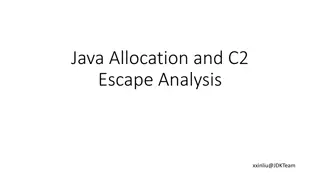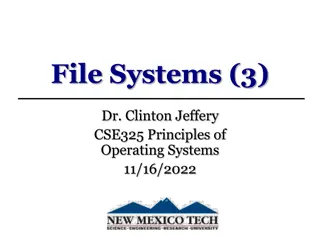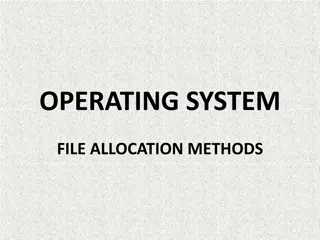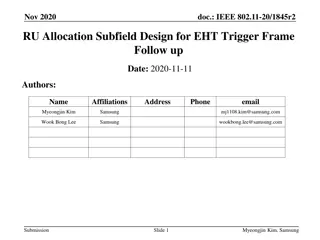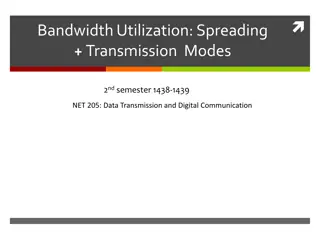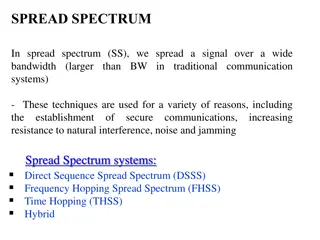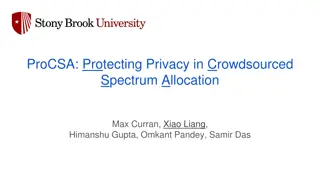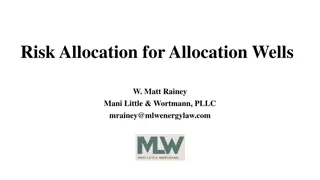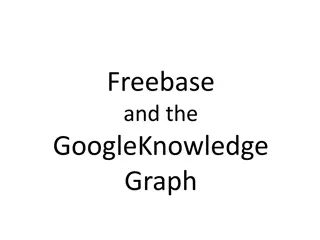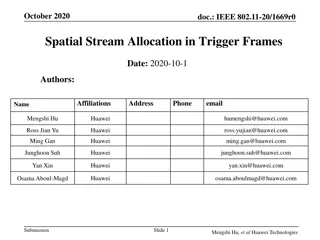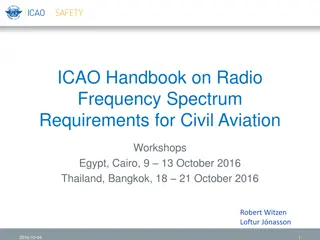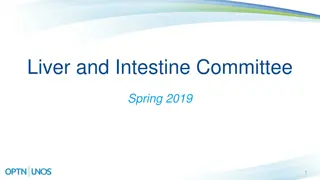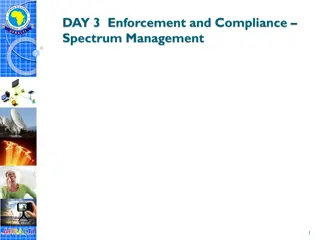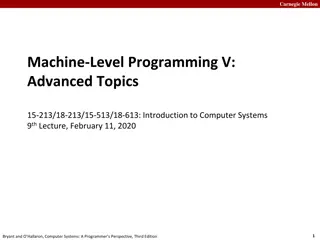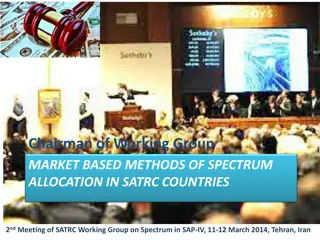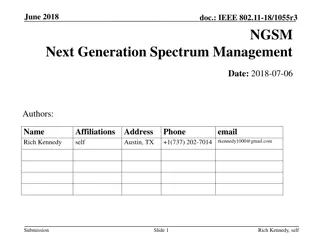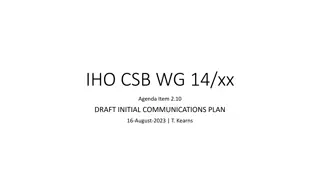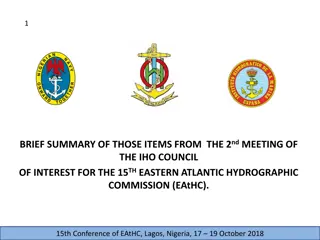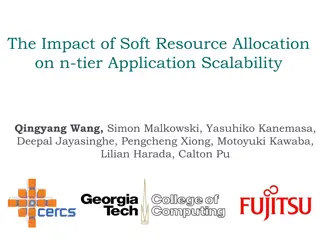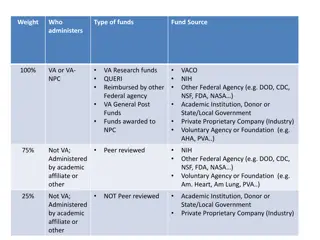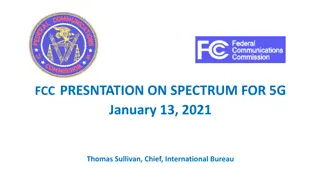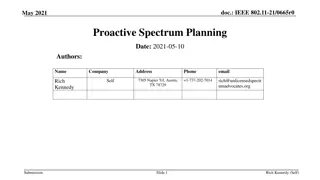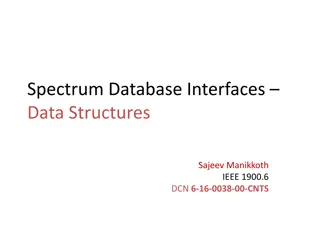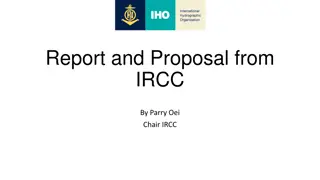Java Allocation and C2
Java object allocation and escape analysis play crucial roles in memory management and performance optimization within the Java Virtual Machine (JVM). This comprehensive overview covers topics such as object vs. scalar allocation, object allocation mechanisms, hotspot escape analysis, ideal and conn
2 views • 22 slides
Understanding File Allocation Strategies in Operating Systems
Explore various file allocation schemes like extent-based systems, linked allocation, file allocation table (FAT), indexed allocation, and combined schemes used in operating systems. Learn about their pros and cons, including details on maximum file size calculations based on disk block sizes and po
0 views • 20 slides
Operating System: File Allocation Methods
File allocation methods in operating systems determine how files are stored in disk blocks. The main methods include Contiguous Allocation, Linked Allocation, and Indexed Allocation. Contiguous Allocation involves allocating blocks in a contiguous manner for efficient disk space utilization and fast
0 views • 14 slides
Proposed Changes to Forward Capacity Cost Allocation
The document discusses proposed changes to the allocation of forward capacity costs effective June 1, 2020. It highlights the need for transparency in cost allocation, focusing on zonal demand curves and the Marginal-Reliability Impact. The current opaque method is critiqued for potential non-intuit
0 views • 47 slides
Designing 9-Bit RU Allocation Subfield for EHT Trigger Frame in IEEE 802.11-20
IEEE 802.11-20/1845r2 presents a proposal for enhancing the RU allocation subfield design in the EHT Trigger frame to accommodate bandwidth support up to 320MHz and multiple RU or MRU allocations for UL MU transmissions in the 11be standard. The modification addresses inconsistencies in MRU mapping
0 views • 34 slides
Spectrum Sensing for Enhanced Channel Access in Wireless Networks
This document presents a proposal for Spectrum Sensing Based Deferral (SSBD) to improve channel access in wireless networks. SSBD incorporates spectrum sensing with transmission deferral in a time-bound manner to enhance performance, reliability, and latency control. The proposed solution safeguards
1 views • 11 slides
Understanding Spread Spectrum Techniques in Data Transmission
Explore the concepts of bandwidth utilization, spreading, and transmission modes in data transmission and digital communication. Learn about spread spectrum techniques such as frequency hopping and direct sequence spread spectrum, which enable efficient sharing of wireless communication channels. Di
1 views • 28 slides
Understanding Spread Spectrum Communication Systems
Spread spectrum techniques involve spreading a signal over a wide bandwidth for various reasons, such as secure communication, resistance to interference, noise, and jamming. This summary introduces Direct Sequence Spread Spectrum (DSSS), Frequency Hopping Spread Spectrum (FHSS), Time Hopping, and h
0 views • 25 slides
Enhancing Privacy in Crowdsourced Spectrum Allocation
This research focuses on protecting privacy in crowdsourced spectrum allocation, addressing the security challenges faced due to the presence of multiple entities and the sensitive information collected. By proposing potential ideas like Fully Homomorphic Encryption (FHE) and Secure Multi-Party Comp
0 views • 26 slides
Risk Allocation for Allocation Wells in Energy Law
Definition of allocation wells in energy law, advantages and disadvantages, lessees' rights, allocation of production to mineral owners, and legal cases related to pooling agreements. The content discusses various aspects of risk allocation for unagreed horizontal wells and the importance of clear a
0 views • 16 slides
Evolution and Demise of Freebase and the Google Knowledge Graph
Freebase was launched in 2005 as an open database of knowledge, initially populated with Wikipedia data and later incorporating crowdsourced updates. Acquired by Google in 2010, it was transitioned into Google's Knowledge Graph before being decommissioned in 2016. The schema contained around 1500 ty
4 views • 12 slides
Spatial Stream Allocation in IEEE 802.11-20 Trigger Frames
The document discusses spatial stream allocation in IEEE 802.11-20 trigger frames, specifically focusing on the SS Allocation subfield. It explains how trigger frames allocate resources for TB PPDU transmissions and solicit User Info fields, detailing the RU Allocation and SS Allocation subfields. T
3 views • 15 slides
Recent Advances in Crowdsourced Entity Matching Problems
Recent research highlights the use of crowdsourcing in entity matching problems, aiming to improve accuracy and efficiency. The study investigates the challenges faced in scaling crowdsourced solutions for large enterprises and explores the limitations of developer-dependent workflows. The need for
0 views • 20 slides
ICAO Handbook on Radio Frequency Spectrum Requirements for Civil Aviation Workshops
This handbook provides insights into spectrum requirements for civil aviation workshops conducted in Egypt and Thailand in October 2016. It covers spectrum strategy, frequency management, spectrum overview for aviation, and frequency assignment planning to support the application of SARPs in Annex 1
0 views • 10 slides
Enhancing Heart-Lung Allocation Policy for Organ Transplantation
This project focuses on improving the allocation of heart-lung blocks for organ transplantation by providing clear guidelines to Organ Procurement Organizations (OPOs). The goal is to ensure consistent practices among OPOs across the country, promoting fairness and efficiency in organ allocation. Th
0 views • 11 slides
Collaboration Team for Seabed 2030 in Denpasar, Bali - Proposal for Enhanced Coordination
Proposal for establishing a Seabed 2030/CSB Coordinator Collaboration Team to enhance communication between RHC Coordinators. The team aims to discuss progress, challenges, and successes semiannually, fostering support for the Seabed 2030 Project and Crowdsourced Bathymetry Initiative. Key recommend
0 views • 7 slides
Understanding Dynamic Memory Allocation in Programming
Dynamic memory allocation is a crucial concept in programming where programmers use allocators like malloc to acquire memory at runtime for data structures. This process involves managing the heap, maintaining variable-sized blocks, and utilizing functions like malloc, free, calloc, realloc, and sbr
0 views • 33 slides
Update in Liver and Intestine Allocation Policies for Spring 2019
The recent updates in liver and intestine allocation policies for Spring 2019 include eliminating region and DSA from the allocation model, prioritizing medical urgency and proximity, enhancing pediatric candidate considerations, and adjusting weights for DCD and elderly donors. Acuity Circles Alloc
0 views • 15 slides
Introduction to Spectrum Management and Regulations
Spectrum management involves administrative and technical procedures to ensure efficient radio-frequency spectrum utilization without interference. It includes allocation, allotment, and assignment of frequencies for various radiocommunication services. Specific terms related to frequency management
0 views • 61 slides
Investigating Underreporting of Pedestrian and Bicycle Crashes Around University Campuses
This study explores the underreporting of pedestrian and bicycle crashes in and around university campuses using a crowdsourcing approach. It discusses the reasons why not all crashes get documented and how crowdsourced data can complement police-reported datasets, providing insights into perception
0 views • 30 slides
Changes in Capacity Allocation Regulations for Gas Infrastructures in Portugal
The new regulation in Portugal brings significant changes in capacity booking and trading to promote convergence with CAM NC and enable a secondary market. Major changes include ex-ante payment of capacity rights, capacity allocation via a booking platform, and enhancement of liquidity in the second
0 views • 13 slides
Unified Pan-Spectrum Fitting Formula for Suprathermal Particles
Unifying spectrum formulas for suprathermal particles, the proposed pan-spectrum formula provides a versatile fitting method encompassing classic double-power-law, band function, and kappa distribution. Motivated by the need for more accurate spectrum information, the formula introduces five paramet
0 views • 14 slides
Understanding Memory Layout and Allocation in Computer Systems at Carnegie Mellon University
Exploring the memory layout and allocation in computer systems through lectures at Carnegie Mellon University, focusing on topics such as buffer overflow vulnerability protection, unions, shared libraries, stack, heap, data locations, addresses, and practical memory allocation examples. The content
1 views • 55 slides
Market-Based Spectrum Allocation Strategies in SATRC Countries
Explore the implementation of market-based methods for spectrum allocation in SATRC countries. Learn about the requirements, benefits, and challenges associated with adopting market-based mechanisms, especially in the context of increasing demand for spectrum and technological advancements. Discover
0 views • 41 slides
Effective Allocation Strategies for Decision-Making
Explore various allocation strategies such as Majority Rule, Random Selection, Authority, and Competition through a scenario of deciding who gets the candy. Analyze the efficiency and fairness of each strategy, consider the balance between economic efficiency and equity, and envision potential impac
0 views • 8 slides
Optimization of Heart-Lung Allocation Policy for Organ Procurement Organizations (OPOs)
This document provides guidance to Organ Procurement Organizations (OPOs) regarding the allocation of heart-lung blocks, focusing on resolving issues related to Policy 6.5.E. The aim is to establish clear policies and principles to ensure consistent allocation practices among OPOs nationwide. Throug
0 views • 11 slides
The System for Transparent Allocation of Resources (STAR) Overview
STAR is a framework implemented by GEF to allocate resources among biodiversity, climate change, and land degradation focal areas. It updates the Resource Allocation Framework to maximize impact, promote environmental policies, and meet country priorities through a structured allocation process. The
0 views • 26 slides
E-GRANT: Resource Allocation Tool Features and Development
E-GRANT is an advanced resource allocation tool developed by EGI-Engage for efficiently managing resources allocation for projects related to computing, storage, and VMs. The tool allows customers to send requests, negotiate resources, sign SLAs, and view allocations. It also enables resources provi
0 views • 5 slides
Next Generation Spectrum Management Initiative Overview
Rich Kennedy presented on the need to change spectrum management practices within IEEE 802, addressing the results of straw polls conducted and proposing further investigation into Multi-band White Space feasibility. The presentation also highlighted the interest in advocating for an AI-managed spec
0 views • 14 slides
Challenges of Flow Rate Fairness in Network Resource Allocation
Addressing the concept of flow rate fairness in network resource allocation, this content explores its limitations and challenges. Despite being a goal in protocols like TCP, the practicality and enforceability of flow rate fairness are questioned. It highlights the inadequacy of flow rate as a meas
0 views • 15 slides
Draft Initial Communications Plan for IHO CSB WG 14/xx
This draft communication plan outlines the objectives, goals, infrastructure, target audience, messages, spokespersons, channels, budget, deliverables, schedule, success metrics, and elements for effectively managing communications related to the Crowdsourced Bathymetry project and its stakeholders.
0 views • 17 slides
Highlights from 15th Conference of EAtHC, Lagos, Nigeria, 17-19 October 2018
Items discussed at the 2nd meeting of the IHO Council during the 15th Eastern Atlantic Hydrographic Commission Conference included ensuring use of the IHO Fund for Special Projects, coordination between RHCs, approval of IHO publication B-12 on Crowdsourced Bathymetry, elimination of overlapping ENC
0 views • 7 slides
Cognitive Radio Network and Game Theory Exploration at University of Houston
Explore the application of cooperative game theory in cognitive radio networks, focusing on spectrum sensing, dynamic spectrum access, and coalitional games. Detailed overview of research conducted at the Department of Electrical and Computer Engineering, University of Houston. Learn about cognitive
0 views • 42 slides
Soft Resource Allocation in N-Tier Application Scalability
This research paper explores the impact of soft resource allocation on n-tier application scalability, discussing topics such as over-allocation, under-allocation, bottleneck issues, and proposing a practical algorithm for effective resource allocation. It also covers the performance implications in
0 views • 36 slides
Understanding VERA Research Funding Allocation Process
The VERA (Veterans Equitable Resource Allocation) system determines the distribution of research funds within the VA. VAMCs report their expenditures, which are weighted and summed to calculate a national price. This price is used to allocate funds to individual sites. VERA dollars are distributed t
0 views • 7 slides
The Future of 5G: FCC's Spectrum Plans and Innovations
The FCC's presentation highlighted the importance of spectrum for 5G development, emphasizing the key components of their 5G FAST Plan. The plan focuses on pushing more spectrum into the market, updating infrastructure policy, and modernizing regulations to drive innovation and investment in the U.S
0 views • 12 slides
IEEE 802 Spectrum Planning: Proactive Approach for Improved Spectrum Management
Exploring the need for proactive spectrum planning in IEEE 802 to better manage the complex process of meeting spectrum needs efficiently and effectively. Delving into the challenges of spectrum allocation, sharing, and optimization to ensure that standards have the RF spectrum necessary for their r
0 views • 9 slides
Understanding Spectrum Databases and PAWS Parameters
Explore the world of Spectrum Databases and PAWS parameters, which provide essential information about available spectrum, permissible power levels, regulatory domains, geolocation data, and more. Learn about typical deployments, data types, and spectrum scheduling to enhance your understanding of s
0 views • 16 slides
International Reports and Proposals on Capacity Building and Maritime Safety
Explore reports on capacity building sub-committee's resource needs, investigating electronic navigation services, challenges in maritime safety information infrastructure in Africa, progress on GEBCO Project Seabed 2030, crowdsourced bathymetry initiatives, and advancements in marine spatial data i
0 views • 14 slides
Effective Asset Allocation Strategies for Investment Success
Investment professionals emphasize the critical importance of the asset allocation decision in shaping investor outcomes. Strategic Asset Allocation (SAA) focuses on long-term goals, while Tactical Asset Allocation (TAA) addresses short-term objectives. Proper navigation through economic cycles invo
0 views • 18 slides
